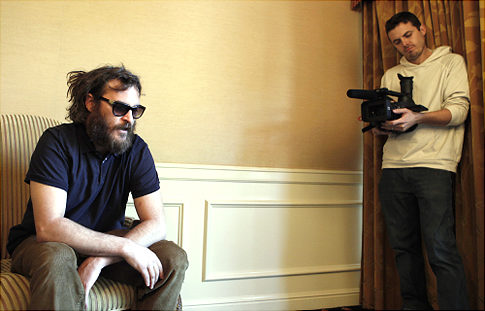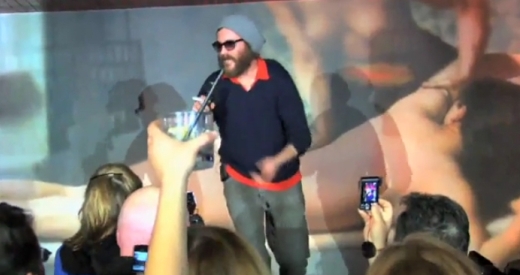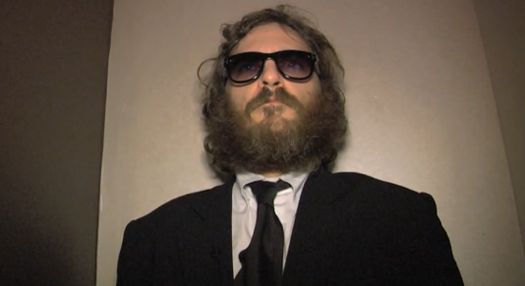Wed 15 Sep 2010
Joaquin’s Not Here Man
Posted by Ethan under Film Review, NYC Film Critic
Comments Off on Joaquin’s Not Here Man
I’m Still Here
Directed by Casey Affleck
Starring Joaquin Phoenix
**
I haven’t had a chance to write much about it, but my favorite film of the year so far is Banksy’s Exit Through the Gift Shop, a serio-comic documentary chronicling the rise of the street art movement over the past decade or so. One of the reasons that I love the film so much is that it can be processed in two very different ways; if, on the one hand, you accept that everyone in the movie is on the level, than Gift Shop plays like a livelier version of one of those traditional “history of…†documentaries, giving viewers a detailed account of street art’s evolution from an after-hours activity to a booming business. But if you, like me, believe that the movie’s central character (a French filmmaker who goes from documenting the exploits of real street artists to staging his own elaborate shows under the moniker Mr. Brainwash) is a creation dreamed up by the director and his cohorts, than the movie becomes a grand stunt that fits squarely into the street art tradition. Either way you choose to view it—straightforward doc or prankish mock—Exit Through the Gift Shop is funny, insightful and truthful…even if it plays around with the exact definition of “truth.â€
I bring up Gift Shop, because it strikes me as a far more successful version of the movie Casey Affleck and Joaquin Phoenix set out to make with I’m Still Here, the much-discussed (in critical circles anyway—based on its less-than-stellar opening weekend numbers, general audiences don’t much care about the “is it real or is it a hoax†question that has reviewers tied in knots) portrait of a tumultuous year in the life of the actor best known for his Academy Award-nominated turns in Gladiator and Walk the Line. Like Banksy, Affleck and Phoenix are trying to construct a film that works as both a documentary and a high-concept prank. The film’s overarching narrative involves Phoenix quitting the acting game in order to pursue a career as a hip-hop artist who records with the likes of Diddy and Dr. Dre. As that dream dims—due to the star’s bad behavior to say nothing of his general lack of rapping talent—he lashes out at those around him, directing much of his rage at his long-suffering personal assistants, one of whom eventually devises a memorable way to retaliate. The movie ends with Phoenix jetting off to rendezvous with his father in Panama (although the closing credits indicate that “Panama†may actually be Hawaii and the role of Papa Phoenix is actually played by Papa Affleck) where he sheds the excesses of the past year in suitably cryptic fashion.
I should say right upfront that I’m on the side of those folks that consider the movie to be more fiction than fact, although I also subscribe to the school of thought that its particular brand of fiction does come from an honest place.* Even when he played the celebrity game straight during his rise to the stardom in the early ‘00s, one got the sense that Phoenix never really enjoyed all the requirements that came with acting in major motion pictures—the inane late-night talk show chatter, the awards circuit, the endless meet-and-greet sessions with industry types. The same could also be said of his brother-in-law (and now director) Affleck, who has always shunned the spotlight, often doing the bare minimum of press in support of his various endeavors. One can picture these two reclusive actors regularly calling each other up to commiserate about the annoyances of press tours and Hollywood glad-handing. And it’s likely out of those conversations that the notion of I’m Still Here was born. It’s not for nothing that the duo named their production company  “They Are Going to Kill Usâ€â€”I’m Still Here is nothing short of a cinematic middle finger flashed in the face of Tinseltown.
The movie’s anger at—and satirical evisceration of—stardom in general and Hollywood in particular is at its most effective in the scenes where Phoenix’s alter ego, an overweight, heavily bearded egomaniac calling himself “Joaquin Phoenix†or “J.P.†for short, deliberately upsets the usual order of things. He slurs and stumbles his way through red-carpet interviews, harangues journalists and mocks fellow celebrities, most notably Ben Stiller, who shows up to pitch Phoenix a role in Greenberg and stoically endures his odd criticisms of There’s Something About Mary. (Stiller gets his revenge later by showing up at the Oscars dressed as J.P., though I do suspect that Phoenix and Affleck approved that gag.) His infamous David Letterman appearance, which is replayed in almost its entirety here, is probably the crowning example of what exactly he and Affleck are out to achieve. Instead of going along with the usual light and upbeat banter that’s expected of celebrity guests on talk shows (banter that we see the real Phoenix reluctantly engage in during an early montage made up of older TV appearances on shows like Live with Regis and Kelly and The Tonight Show) J.P. sits there stone-faced, occasionally mumbling nonsensical responses to Letterman’s increasingly irate questions.
At the time that appearance happened, the general perception was that Phoenix was either bombed out of his mind or just being a jackass, but seen in the context of I’m Still Here, it’s clear that he used the opportunity to make a point about the vapidity of shows like Late Night. And again, seen in context, the media anger directed at Phoenix in the wake of his Letterman appearance is telling. Instead of smiling and following the script, he drew attention to the artifice supporting contemporary celebrity culture. As much as we in the press complain about how predictable most celebrity profiles and interviews are, we’re not always comfortable when our subjects suddenly go off book and too often our initial response is snark and contempt. For me, one of the most memorable moments of I’m Still Here finds J.P. watching a YouTube clip of an amateur entertainment journalist who ridicules Phoenix and declares his career over. This kid has never met the person he’s talking about and knows nothing about him beyond what he’s seen on Letterman and in his other media appearances. Yet he feels qualified to sit there and pass judgment both on Phoenix as a person and as an actor. With people like that around, small wonder that both Phoenix and Affleck are so disenchanted with the Hollywood game.
If only the rest of the movie were as insightful as that one isolated incident.  But having created this potent premise, Affleck doesn’t seem entirely certain where to take it. Too much of the film consists of its star rampaging around yelling at everyone in sight, as if the mere sight of an unkempt, overweight Phoenix is enough to send the audience into hysterics. The actor is to be commended for inhabiting his role (and it is a role, make no mistake about that) so fully, but as the movie plods along his sheer obnoxiousness simply becomes punishing. I’m Still Here also suffers from slack pacing and haphazard editing—it’s shapeless in a way that suggests Affleck and his editing team is making it up entirely out of odds and ends. A film like Exit Through the Gift Shop (or even movies like Borat or Bruno, which also seem to be an inspiration) succeeds because, at a certain point, you stop trying to guess what’s real and what’s fake and just enjoy the ride. In contrast, I’m Still Here is never entertaining or interesting enough to keep you from trying to poke holes in its version of reality.
I’m Still Here opened in limited release on Friday, September 10 and expands to more theaters this weekend.
*Since this review was originally published, Casey Affleck has admitted that the movie is entirely fictionalized.





No Responses to “ Joaquin’s Not Here Man ”
Sorry, comments for this entry are closed at this time.